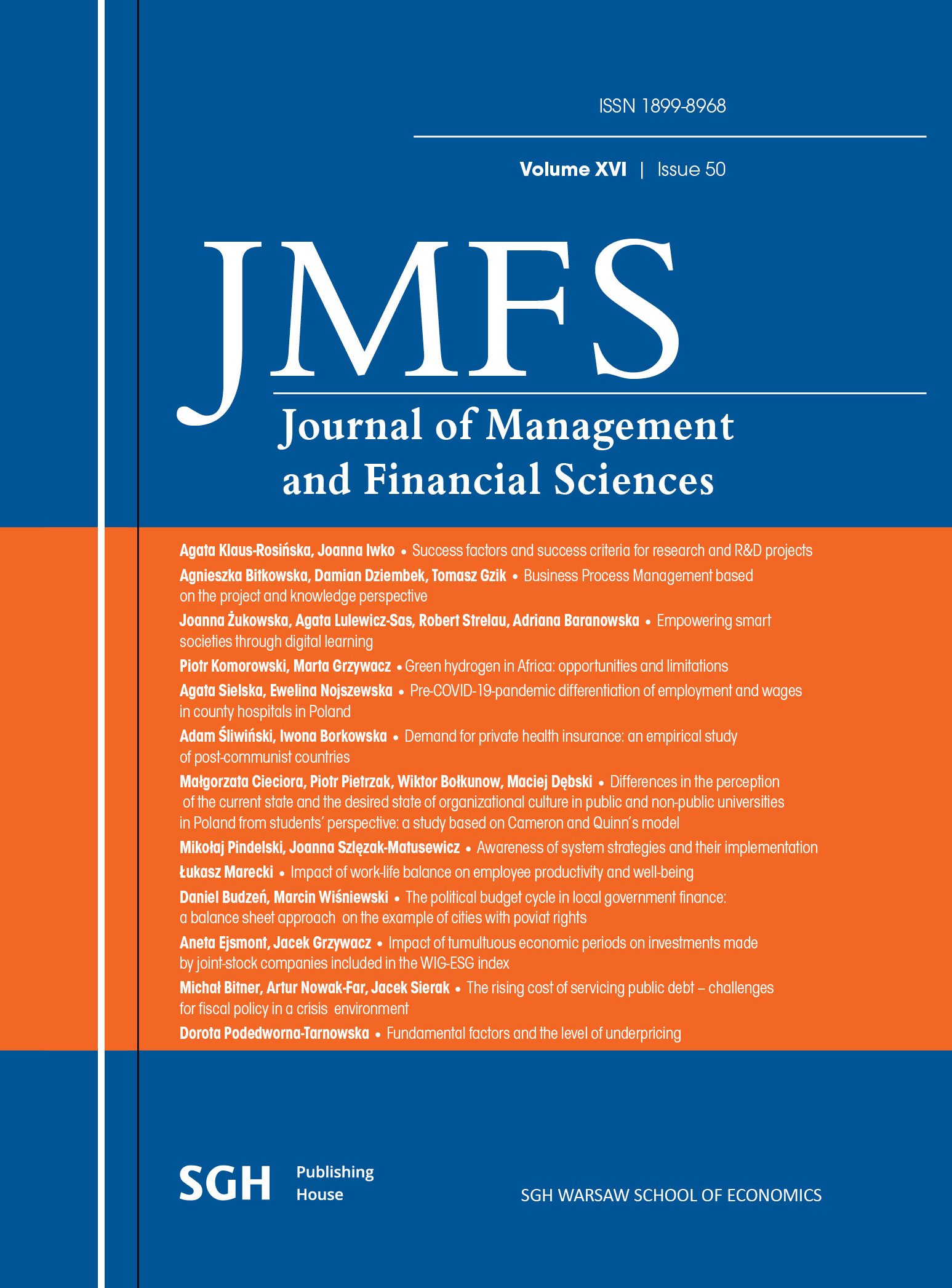Awareness of system strategies and their implementation
Main Article Content
Abstrakt
The aim of this study is to determine the recognition and awareness of systemic strategies within the realm of practical business operations at three different levels of the organizational hierarchy. Two research hypotheses have been formulated. H1: The implemented strategy will be described as systemic. H2: Employees will assert the implementation of strategies through a systemic approach. The hypotheses were tested using a questionnaire survey administered to a convenience sample of postgraduate/post-diploma working students associated with sales functions. The survey included 1,400 respondents, divided into a pre-pandemic sample of 1,050 individuals and a post-pandemic sample of 350 individuals. A combination of traditional paper questionnaires and computer-assisted telephone interviews (CATI) was used to collect responses. The analysis of the survey responses reveals that the respondents from both the 2019 and 2022 cohorts do not affirm the existence of systemic strategies within their respective organizations. Furthermore, they do not claim that these strategies are implemented from a systemic perspective.
Downloads
Article Details

Utwór dostępny jest na licencji Creative Commons Uznanie autorstwa 4.0 Międzynarodowe.
Bibliografia
Ackoff, R. L. (1973, May-June). Science in the Systems Age: Beyond IE, OR and MS. Operations Research, 21 (3), pp. 661–671.
Bełz, G. (2011). System zarządzania jako regulator odnowy i wzrostu przedsiębiorstw. Prace Naukowe UE we Wrocławiu, 153. Wrocław: Wydawnictwo Uniwersytetu Ekonomicznego we Wrocławiu.
Bertalanffy, von L. (1984). Ogólna teoria systemów. Podstawy, rozwój, zastosowania. Warszawa: PWN.
Bititci, U. S., Spanelli, A. (2023). Systems Thinking for Business and Management. Principles and Practice. London: Kogan Page.
Coetzee, Ch. (2021). Simple rules and self – organisation: A complex systems’ perspective on South Africa’s COVID-19 response. Jamba: Journal of Disaster Risk Studies, 13 (1), doi: http://dx.doi.org/10.4102/jamba.v13i1.1013
Devaney, R. L. (2018). A First Course in Chaotic Dynamical Systems. Theory and Experiment. Boca Raton: CRC Press, doi: https://doi.org/10.1201/9780429503481
GUS (2021a). Zatrudnienie i wynagrodzenia w gospodarce narodowej w 2020. Warszawa: GUS, pp. 18.
GUS (2021b). Pracujący w gospodarce narodowej w 2020 r. Warszawa: GUS.
Luhmann, N. (1995). Social systems. New York: Stanford University Press.
Luhmann, N. (2004). Law as a social system. Oxford: Oxford University Press.
Luhmann, N. (2013). Introduction to systems theory. Cambridge: Polity Press.
Muller-Stewens, G., Lechner, Ch. (2003). Prozessforschung – Grundlagen und Perspektiven. In: M. J. Ringsletter, H. A. Henzler, M. Mirow (Eds.). Perspektiven der Strategischen Unternehmensfuhrung. Theorien – Konzepte – Anwendungen, Gabler Verlag Wiesbaden, pp. 43–71.
Pindelski, M. (2019). Świadomość strategii i jej realizacji. Perspektywa pracowników sprzedaży. Warszawa: Oficyna Wydawnicza SGH.
Richardson, K. A. (2004). Systems Theory and Complexity. Part 2. E:CO Issue, 6 (4), pp. 77–82.
Romano, A., Spadaro, G., Balliet, D., Joireman, J., Van Lissa, C., Jin, S., Agostini, M., Belanger, J. J., Gutzkow, B., Kreienkamp, J., Leander, P. N. (2021). Cooperation and Trust Across Societies During the COVID-19 Pandemic. Journal of Cross Cultural Psychology, 52 (7), doi: https://doi.org/10.1177/0022022120988913
Rüegg-Stürm, J. (2004). Das neue St. Galler Management-Modell. Grundkategorien einer integrierten Managementlehre, 2, Bern/Stuttgart/Wien: Der HSG-Ansatz, p. 22.
Rüegg-Stürm, J. (2016). The New St. Gallen Management Model. London: Palgrave, pp. 20–26.
Rüegg-Stürm, J., Grand, S. (2014). Das St. Galler Management-Modell: 4. Generation – Einführung. Bern: Haupt Verlag.
Scholz, C. (1987). Corporate Culture and Strategy. The Problem of Strategic Fit. Long Range Planning, 20 (4), pp. 78–87.
Schwaninger, M. (2006). System Dynamics and the Evolution of the Systems Movement. Systems Research and Behavioral Science, 23 (5), pp. 583–594.
Selznik, P. (1948). Foundations of the Theory Organization. American Sociological Review, 13 (1), pp. 25–35.
Snabe, B., Größler, A. (2006). System dynamics modelling for strategy implementation – case study and issues. Systems Research & Behavioral Science, 23 (4), pp. 467–481.
Stabryła, A. (1984). Analiza systemowa procesu zarządzania. Wrocław: PAN, Zakład Narodowy im. Ossolińskich.
Stabryła, A. (2000). Zarządzanie strategiczne w teorii i praktyce firmy. Warszawa–Kraków: Wydawnictwo Naukowe PWN.
Waterman, R. H., Peters, T. J. (2012). In Search of Excellence. Lessons from America’s Best-Run Companies. Collins.
Waterman, R. H., Peters, T. J., Philips, J. R. (1980). Structure is not Organization. Business Horizons, 23 (3), pp. 14–26.
Wiener, N. (2013). Cybernetics. Eastford, CT: Martino Fine Books.
